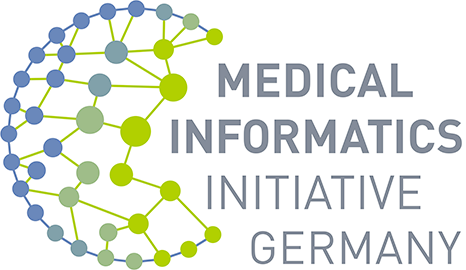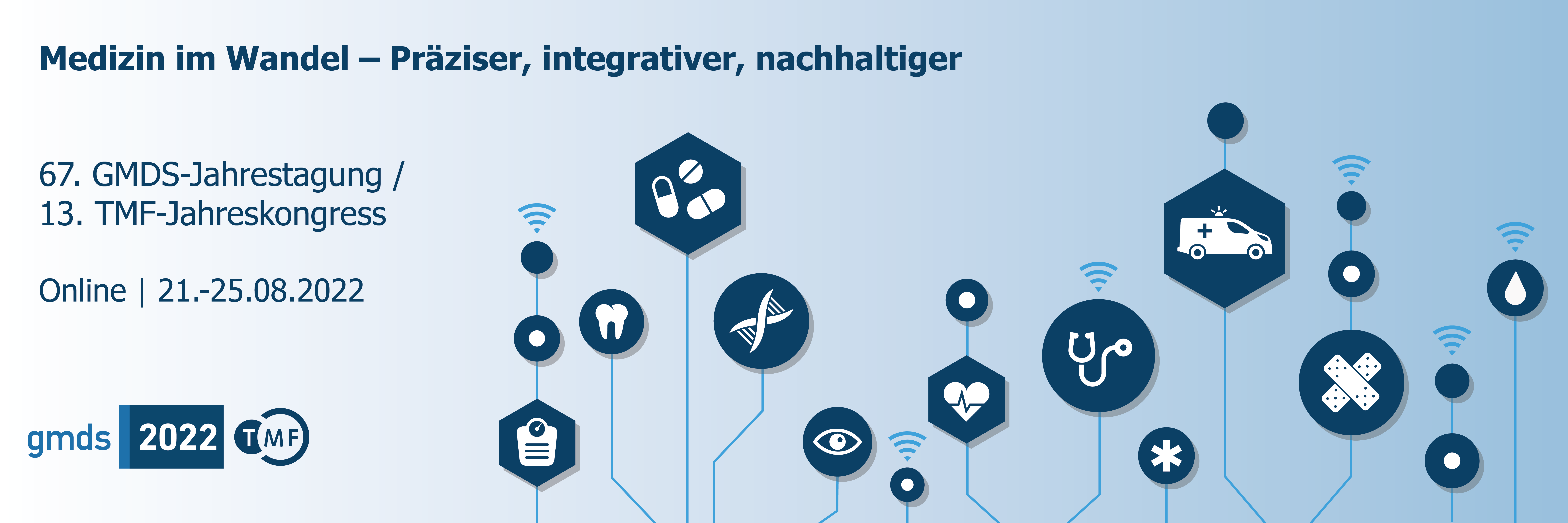25/08/2022. Under the motto "Medicine in Transition - More Precise, More Integrative, More Sustainable", some 500 scientists gathered from 21st to 25th of August 2022 for the annual digital conference of the German Society for Medical Informatics, Biometry and Epidemiology (GMDS) and TMF - Technology, Methods and Infrastructure for Networked Medical Research. They discussed opportunities and challenges in the field of medical data sciences.
Demographic, sociological and technological changes call for new ways to tailor medical care better to the needs of patients. "Given the current societal crises, greater efficiency and sustainability are further issues for medicine. Medical care consumes an enormous amount of economic resources. Personalisation promises not only better care for individual patients, but also savings thanks to more targeted prevention and therapy", said conference president Prof. Michael Krawczak from University Hospital Schleswig-Holstein, Kiel Campus on welcoming the conference participants. New technical and methodological developments from the interdisciplinary field of medical data sciences help to improve how the data, information and knowledge required for this purpose are linked and utilised. In this way, research can help to make medicine more efficient and sustainable in our changing world. "It is precisely such collaboration between medical informatics, biometry, epidemiology, bioinformatics and medical documentation that contributes to putting new findings into action faster than ever before", emphasised GMDS President Prof. Harald Binder at the opening of the conference.
The discussion focussed on technical and methodological issues related to the use of health data in research
During the five-day conference, distinguished speakers from Germany and abroad addressed the issues of availability, data utilisation, data protection and security of health data in five keynote speeches, 23 presentation sessions and two panel discussions. The ethical, legal and policy frameworks surrounding the use of health data in research were further areas of focus, in particular the panel discussion "Health data architecture for care and research: How does what belongs together grow together?”. Representatives of major research infrastructure initiatives participated in this discussion.
"The goal of major initiatives, such as the Medical Informatics Initiative (MII) and the Netzwerk Universitätsmedizin (NUM - German Network of University Medicine) is to make health data from different sources more accessible and available for research", explained TMF Managing Director Sebastian C. Semler. At a political level, this concern will be moved ahead during the current legislative period by passing a research data law and a health data utilisation law, among other things. "This will require comprehensive infrastructure planning and consolidation of existing initiatives", said Semler.
Potential, opportunities and requirements of a networked health data architecture for research and care
Cooperation between different health research institutions and infrastructures is becoming increasingly important. In recent years, science and politics have already launched major data initiatives, which now need to be combined. The Medical Informatics Initiative will become the core of data-based health research in Germany and provide scientists with a wide spectrum of medical data.
"The future national portal for medical research data (FDPG) established by the MII must pave the way towards the ability to locate research data using a uniform access path, regardless of where the respective project is being conducted", demanded MII consortium leader Prof. Hans-Ulrich Prokosch. In future, the MII will cooperate more closely with NUM to better exploit potential synergies between the two initiatives.
The genomDE initiative, funded by the German Federal Ministry of Health, aims to establish a nationwide platform for medical genome sequencing and the exchange of the resulting molecular data. "Genomic medicine requires care concepts that generate knowledge. The core element of these must be a comprehensive data infrastructure for outcome-based evaluation and iterative adaptation of care concepts. To achieve this, it is essential to network and merge existing databases", stressed TMF board member Prof. Rita Schmutzler from the University Hospital of Cologne.
In turn, the German Centres for Health Research (DZG) drive forward research into major common diseases and are important medical innovators. "The increasing prevalence of multimorbid patients requires us to employ comprehensive research approaches. These, in turn, necessitate a shared data infrastructure", explained Prof. Wolfgang Hoffmann, site spokesperson at the German Centre for Neurodegenerative Diseases (DZNE), Greifswald University Hospital.
In future, collaborations between these institutions and initiatives could promote the use of potential synergies by pooling expertise and supporting the development of new methods and technologies. The speakers agreed that a cultural change within the science world is needed, not only to make such collaborations a reality, but also to create a true culture of data sharing.
The issue of data protection
Data protection often becomes an issue in cross-institutional and multi-country research projects. National and European data protection law makes the use of personal data for research purposes a complex matter. "In data protection, there is an enormous discrepancy between legal views and everyday scientific practice", explained Prof. Georg Schmidt of the Arbeitskreis Medizinischer Ethikkommissionen (AKEK) in der Bundesrepublik Deutschland e.V. (association of medical ethics committees in Germany). "The EU General Data Protection Regulation is interpreted in a variety of ways by federal and state data protection authorities and by local data protection officers with a tendency toward a strict definition of the legal framework". For this reason, Prof. Sebastian Graf von Kielmansegg, Christian-Albrecht University of Kiel, recommends that the current legal options for using data for medical research must be utilised more consistently. Prof. Klaus Pommerening, long-standing spokesman of the TMF working group on data protection, would like to see current data protection concepts comprehensively adapted, further developed and expanded to meet the requirements of digitilisation in medicine. "We will only improve therapies if we make consistent use of the treasure trove of medical data that already exists and is still emerging. Excessively rigorous data protection not only costs money, it also costs lives. Whatever is possible elsewhere in EU regions within an identical EU legal framework, such as in Estonia or Denmark, must also be possible in Schleswig-Holstein", demanded Dirk Schrödter, Head of the State Chancellery of Schleswig-Holstein.
Involving patients is vital
Hannelore Loskill, of BAG Selbsthilfe, called for providing patients with better information on how their data is used for medical research. “There can be no research without patients”, said Loskill. Patients are often willing to make their data available, but they must be regularly and comprehensively informed about the goals and progress of the research.
Further Information: https://gmds-tmf-2022.de/
Press contact:
Wiebke Lesch, Tel.: +49 30 2200 24731, Mobil: +49 177 2663257,
E-Mail: presse@tmf-ev.de, Twitter: @tmf_eV
Über die TMF e. V.
Die TMF ist die Dachorganisation für die medizinische Verbundforschung in Deutschland. Sie ist die Plattform für den interdisziplinären Austausch und die projekt- wie standortübergreifende Zusammenarbeit, um gemeinsam die organisatorischen, rechtlich-ethischen und technologischen Probleme der modernen medizinischen Forschung zu identifizieren und zu lösen. Die Lösungen reichen von Gutachten, generischen Konzepten und IT-Anwendungen über Checklisten und Leitfäden bis zu Schulungs- und Beratungsangeboten. Die TMF stellt diese Lösungen frei und öffentlich zur Verfügung.
Über die GMDS e. V.
Die Deutsche Gesellschaft für Medizinische Informatik, Biometrie und Epidemiologie e. V. ist mit derzeit ca. 2.000 Mitgliedern die einzige wissenschaftliche Fachgesellschaft in Deutschland, Österreich und der Schweiz, die die fünf Disziplinen Medizinische Informatik, Medizinische Biometrie, Epidemiologie, Medizinische Dokumentation und Medizinische Bioinformatik und Systembiologie gemeinsam vertritt. Sie kooperiert mit einer Reihe benachbarter Fachgesellschaften und Verbände. Zudem entwickelt sie die Fachgebiete weiter durch sachverständige Repräsentation u. a. bei der Planung von Förderungsmaßnahmen der Öffentlichen Hand, bei Fragen der Standardisierung und Normung, bei der Errichtung von Lehrinstitutionen, bei Ausbildungs-, Weiter- und Fortbildungsfragen und bei gesetzgebenden Maßnahmen.


